Input interpretation

methyl chloride
Chemical names and formulas
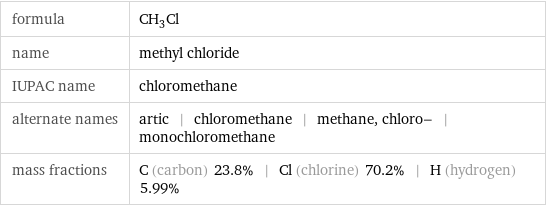
formula | CH_3Cl name | methyl chloride IUPAC name | chloromethane alternate names | artic | chloromethane | methane, chloro- | monochloromethane mass fractions | C (carbon) 23.8% | Cl (chlorine) 70.2% | H (hydrogen) 5.99%
Lewis structure
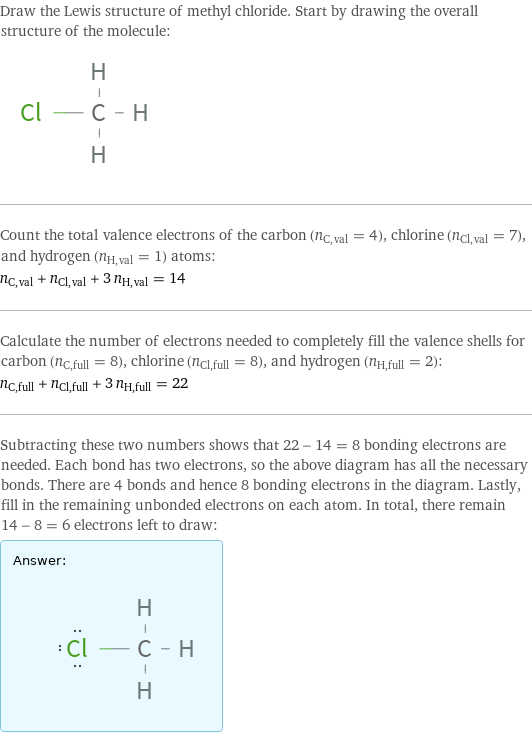
Draw the Lewis structure of methyl chloride. Start by drawing the overall structure of the molecule: Count the total valence electrons of the carbon (n_C, val = 4), chlorine (n_Cl, val = 7), and hydrogen (n_H, val = 1) atoms: n_C, val + n_Cl, val + 3 n_H, val = 14 Calculate the number of electrons needed to completely fill the valence shells for carbon (n_C, full = 8), chlorine (n_Cl, full = 8), and hydrogen (n_H, full = 2): n_C, full + n_Cl, full + 3 n_H, full = 22 Subtracting these two numbers shows that 22 - 14 = 8 bonding electrons are needed. Each bond has two electrons, so the above diagram has all the necessary bonds. There are 4 bonds and hence 8 bonding electrons in the diagram. Lastly, fill in the remaining unbonded electrons on each atom. In total, there remain 14 - 8 = 6 electrons left to draw: Answer: | |
3D structure

3D structure
Basic properties
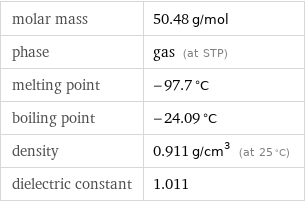
molar mass | 50.48 g/mol phase | gas (at STP) melting point | -97.7 °C boiling point | -24.09 °C density | 0.911 g/cm^3 (at 25 °C) dielectric constant | 1.011
Gas properties (at STP)
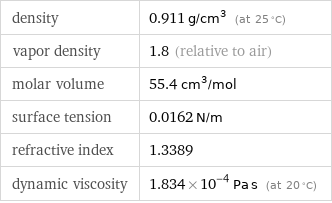
density | 0.911 g/cm^3 (at 25 °C) vapor density | 1.8 (relative to air) molar volume | 55.4 cm^3/mol surface tension | 0.0162 N/m refractive index | 1.3389 dynamic viscosity | 1.834×10^-4 Pa s (at 20 °C)
Units

Thermodynamic properties
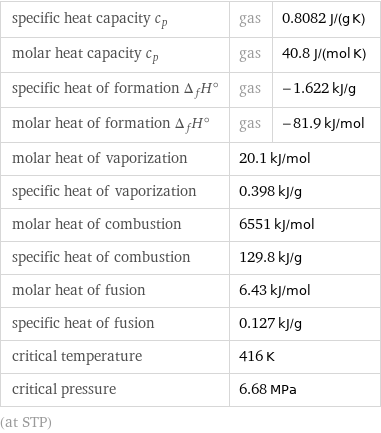
specific heat capacity c_p | gas | 0.8082 J/(g K) molar heat capacity c_p | gas | 40.8 J/(mol K) specific heat of formation Δ_fH° | gas | -1.622 kJ/g molar heat of formation Δ_fH° | gas | -81.9 kJ/mol molar heat of vaporization | 20.1 kJ/mol | specific heat of vaporization | 0.398 kJ/g | molar heat of combustion | 6551 kJ/mol | specific heat of combustion | 129.8 kJ/g | molar heat of fusion | 6.43 kJ/mol | specific heat of fusion | 0.127 kJ/g | critical temperature | 416 K | critical pressure | 6.68 MPa | (at STP)
Chemical identifiers
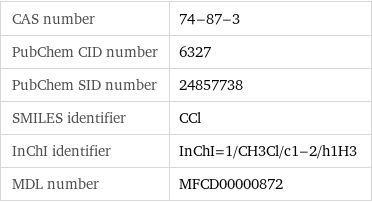
CAS number | 74-87-3 PubChem CID number | 6327 PubChem SID number | 24857738 SMILES identifier | CCl InChI identifier | InChI=1/CH3Cl/c1-2/h1H3 MDL number | MFCD00000872
NFPA label

NFPA label
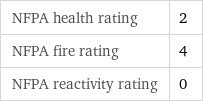
NFPA health rating | 2 NFPA fire rating | 4 NFPA reactivity rating | 0
Safety properties
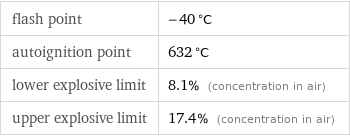
flash point | -40 °C autoignition point | 632 °C lower explosive limit | 8.1% (concentration in air) upper explosive limit | 17.4% (concentration in air)

DOT hazard class | 2.1 DOT numbers | 1063
Toxicity properties

odor | faint | sweet short-term exposure limit | 210 mg/m^3

long-term exposure limit | 105 mg/m^3 (over 8 hours) RTECS classes | tumorigen | mutagen | reproductive effector | human data